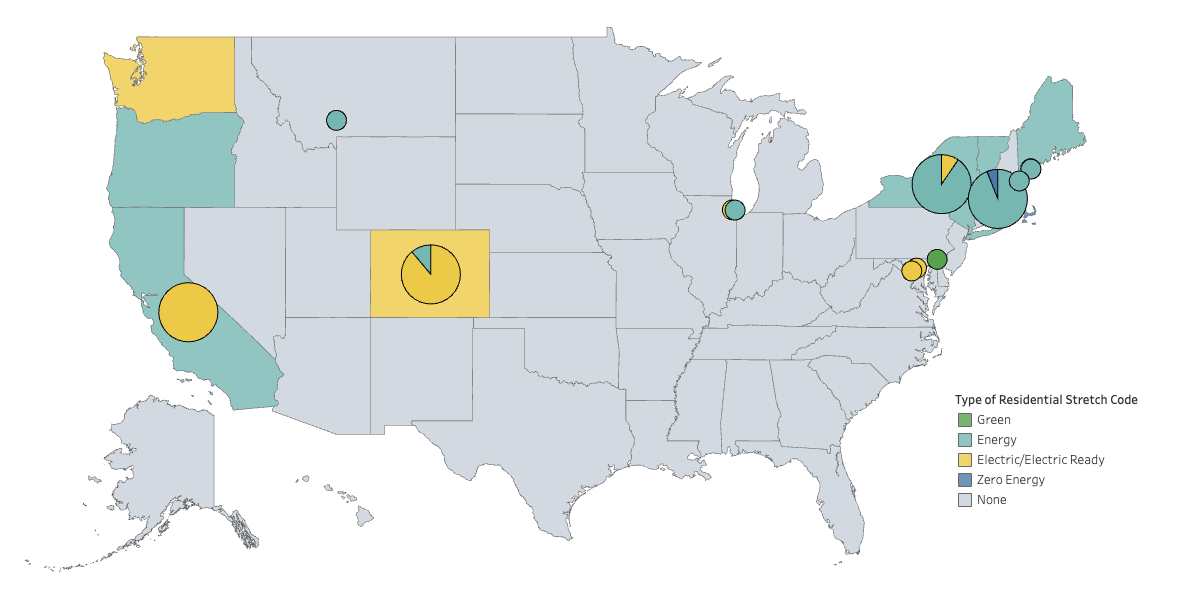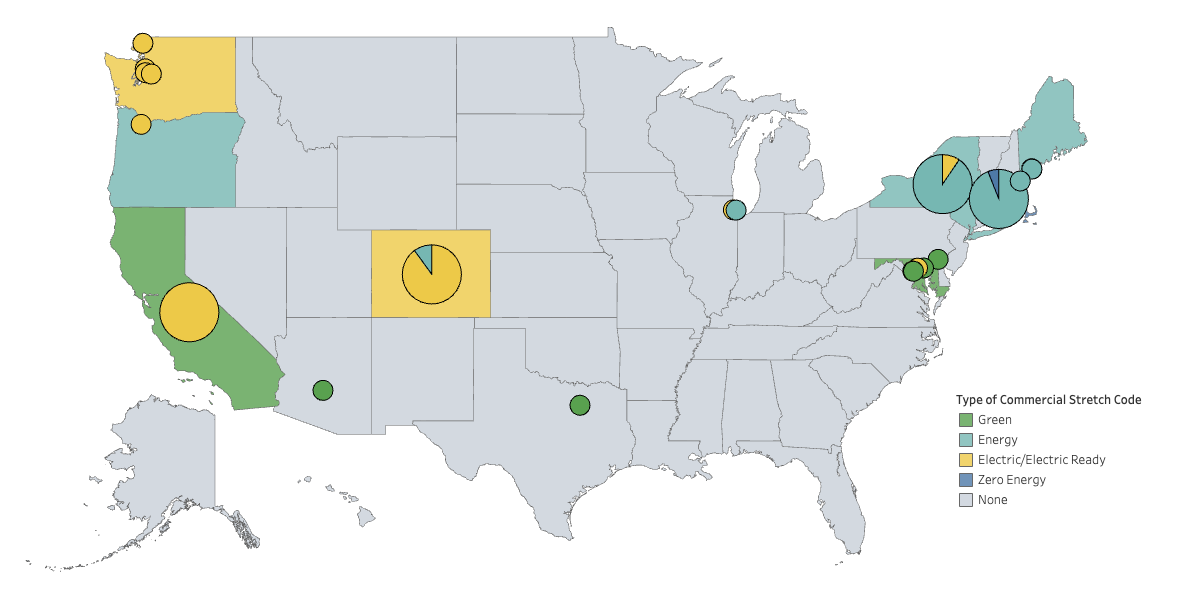A stretch code is an adoptable and enforceable code that exceeds the requirements of the base code. Stretch codes typically enhance building energy efficiency and may also contain additional considerations like building material impacts, water efficiency, renewable energy, and resilience or grid security. Stretch codes may be required for specific building types, building sizes, certain funding or incentive programs, or be voluntary.
Many times, a stretch code will be based on the next version of the model code; for example, a state may adopt the 2021 International Energy Conservation Code (IECC) as the base code and the 2024 IECC as the stretch code. A state or jurisdiction (e.g., OR, MA, VT) may also produce and adopt a state- or jurisdiction-specific stretch code. A stretch code is adopted and developed using the same public process as other energy codes and provides uniform criteria across a state or municipality.
The approach to developing stretch codes varies and may set requirements for a single code cycle (e.g., 20 percent better than ASHRAE 90.1) or may set an end goal that can be achieved over multiple code cycles. For example, British Columbia, Canada, has adopted a "step" stretch code which is a stretch code with multiple levels of increasingly stringent compliance options. Stretch code compliance paths vary from prescriptive, performance, or points based.
Overall, stretch codes benefit communities, home and building owners, and renters by:
- Reducing operational building and utility costs.
- Improving occupant comfort, and health, and resilience.
- Creating and sustaining efficiency-related jobs.
- Raising a building or home valuation.
- Strengthening the building and design industry and moving market trends toward efficiency.
State and Local Stretch Code Maps
The Building Energy Codes Program (BECP) tracks stretch codes at the state and local levels. The residential and commercial stretch code maps and corresponding tables visualize the current state of stretch codes in the United States. Navigate the maps below by selecting a state or local jurisdiction to learn what type of stretch code has been adopted and other information. The maps are updated on a quarterly basis.
Technical Briefs
In response to the high demand, the U.S. Department of Energy (DOE) and Pacific Northwest National Laboratory (PNNL) have developed a series of technical briefs supporting national, state, and local initiatives to update and advance building energy codes. These technical briefs are presented in a module-based format, based on technologies, measures or practices (or optimized combinations) that can be incorporated as “plug-ins” to building energy codes. These plug-ins are made available for adoption directly by state and local governments pursuing advanced energy savings, as well as for future consideration for the International Energy Conservation Code (IECC) and Standard 90.1. The collection supports the adoption of stretch codes, helping state and local governments pursue their energy and savings goals, as well as the Department’s broader mission to provide technical assistance supporting the implementation of state and local energy codes (42 USC 6833).
Currently available plug-ins are presented below. Each tech brief provides an overview of a given topic, plus supporting technical information and analysis estimating the associated impacts. In addition, sample code language is provided to illustrate how a given concept can be overlaid on top of the current model codes (e.g., IECC or Standard 90.1). Additional technical assistance is available from DOE and PNNL to support states and local governments who are interested in adding these concepts or other “stretch” provisions to their building codes. Assistance typically includes technical guidance, customized analysis of expected impacts (e.g., based on state-specific building stock, climate considerations, or utility prices), and further tailored code language to overlay state building codes or other standards. DOE works continuously with states and local governments to identify new concepts and practices that support their needs and plans to issue additional plug-in concepts in the future on a rolling basis.
| Title | Description | Report Link | Fact Sheet Link |
|---|---|---|---|
| Service Water Heating System Performance Approach | This technical brief provides an additional Service Water Heating (SWH) System Performance path that goes beyond the prescriptive energy code by outlining a comprehensive performance-based approach for SWH system evaluation and analysis. | SWH Performance Approach Tech Brief | |
| Simplified HVAC System Performance |
The technical brief provides an additional heating, ventilation, and air conditioning (HVAC) System Performance (HSP) path that goes beyond the prescriptive energy code. It provides a comprehensive performance-based approach for HVAC system evaluation and analysis. The approach develops a Total System Performance Ratio (TSPR) to compare proposed, target, and reference HVAC systems. The technical support documentation (TSD) provides background on development of mechanical system performance factors for use in the HSP for ASHRAE Standard 90.1-2022. It provides documentation of HVAC system input parameters and simplified HVAC measure modeling approaches. |
|
HSP Fact Sheet |
| Energy Credits | This technical brief provides additional efficiency measures that go beyond the current prescriptive commercial energy codes. It demonstrates relative savings for multiple measures and shows a base savings package by building type and climate zone that is cost effective for building owners and tenants. | Energy Credits Tech Brief Energy Credits Application Guide: ASHRAE Standard 90.1-2022 |
Energy Credits Fact Sheet |
| BPS and Energy Code Alignment | This technical brief presents recommendations for changes that may be incorporated into energy codes to facilitate future compliance with the building performance standard (BPS) policies that a newly constructed building has to meet once it is occupied. It provides background on the basis and benefits of the proposed changes and model code language that can be inserted into ASHRAE Standard 90.1 or adapted into other energy codes. | Code Alignment Tech Brief | |
| GEB (Demand Response) | This technical brief provides requirements for demand-responsive thermostats, water heaters, and energy storage to provide additional grid flexibility to states and jurisdictions working to strengthen the security of their electrical grid. It provides background on these devices, impacts on the cost of construction, and model code language that can be plugged into the IECC or adapted into other energy codes. | GEB Tech Brief | GEB Fact Sheet |
| Electric Readiness | To assist states and jurisdictions that have requested assistance in future proofing their buildings, this technical brief provides requirements for electric readiness for the future installation of these technologies. It provides background on the basis and benefits of the provisions, and model code language that can be plugged into the IECC or adapted into other energy codes. | Electric Readiness Fact Sheet | |
| EV Charging |
States and local governments have requested that DOE provide technical assistance to develop energy code overlay requirements to support their policy goals. This technical brief provides code language for PEV charging infrastructure for adoption by model codes, and states and local governments. |
EV Tech Brief | EV Fact Sheet |
| Commercial Zero Code Plug-In | This commercial zero code plug-in technical brief presents modified code language that can be amended to adopted commercial building model energy codes to achieve net zero energy (NZE) in newly constructed buildings, either immediately or over several code cycles. An option to achieve net zero operational energy emissions (NZOEE) has also been included to align with the ASHRAE 90.1 standard. | Commercial Plug-In | Zero Code Plug-in Fact Sheet |
| Residential Zero Code Plug-in | This residential zero code plug-in technical brief presents modified code language that can be amended to adopted residential building model energy codes to achieve net zero energy (NZE) and net zero operational energy emissions (NZOEE) in newly constructed buildings, either immediately or over several code cycles. Both prescriptive and performance-based approaches are included. | Residential Plug-in | Zero Code Plug-in Fact Sheet |
Additional Stretch Code Proposals
Below are draft code change proposals DOE has developed in support of state, local, and model code development processes.
| Title | Proposal Link |
|---|---|
| Clarify Slab Insulation Requirements | Proposal |
| Commercial PV Required | Proposal |
| Decorative Lighting Power Reduction | Proposal |
| Demand Control Ventilation Update | Proposal |
| Exterior Lighting | Proposal |
| Interior Lighting LPD Update | Proposal |
| Lighting System Performance | Proposal |
| Residential PV Required | Proposal |
| Residential Renewable Tradeoffs for Performance Path | Proposal |
Other Resources
Building Energy Codes and Grid-Interactive Efficient Buildings
Filling the Efficiency Gap to Achieve Zero-Energy Buildings with Energy Codes
Realizing Demand Flexibility with Commercial Building Energy Codes
Methodology to Establish Performance Targets for Building Energy Codes


